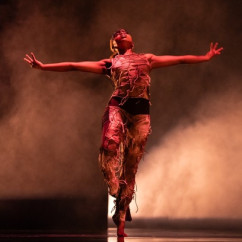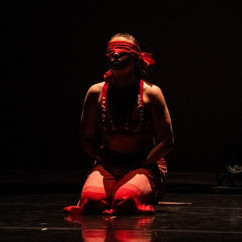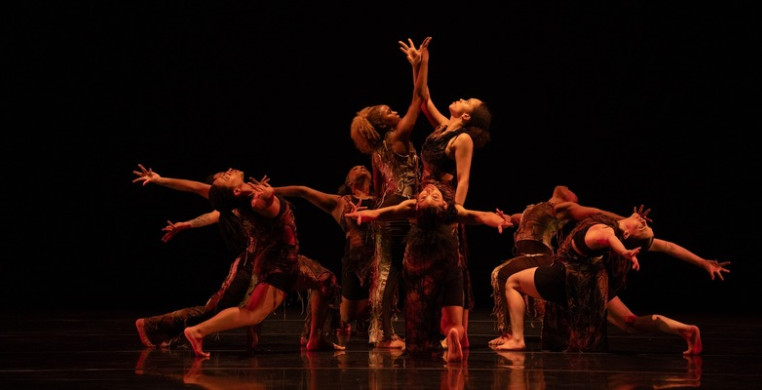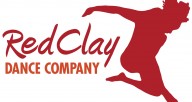Red Clay presents "Turning Points," its first-ever repertory concert, October 25-26 at the Logan Center, featuring three works: Sanders-Ward’s “Unconditional Conditions” (2024), local artist Amansu Eason’s “DevelopMino” (2015) and Philadelphia-based Lela Aisha Jones’ “We all ’gon die: into revivals” (2021). Vershawn Sanders-Ward, Founding Artistic Director and CEO of Red Clay Dance has been consistently creating new choreography—only two other artists have been invited to set work on the company in its 16-year existence. She feels that now is the time to revisit and refresh some of the company's finest repertoire.
In an interview with See Chicago Dance, Sanders-Ward provides insight into her work, “Unconditional Conditions,” inspired by Paul Lawrence Dunbar’s poem “We Wear the Mask,” and featuring music by Missy Elliott, Moses Sumney and Ran Bango. “Last March, I was doing some leadership work for the admin side of Red Clay,” says Sanders-Ward, “and we were doing a lot of reading about ‘shadow work,’ understanding your shadow side as a leader and what things about your persona you kind of hide, or not make visible, to whoever you are engaging with.”
 "Unconditional Conditions," with Red Clay Dance; Photo by Michelle Reid
"Unconditional Conditions," with Red Clay Dance; Photo by Michelle Reid
She recalled Dunbar’s poem about the face we put on in society versus the natural one we wear when we’re alone, and she realized that, “To have this mask we put on when we leave our home and go wherever, it’s to protect your inner and vulnerable self,” and also, “when and where you allow yourself to remove that mask and be fully yourself.” Elements of the poem emerge metaphorically as masquerade-style masks that hide dancers’ identities.
Sanders-Ward had a lot of time to think during the two years of COVID lockdowns, and the choreography reflects those moments of isolation and self-reflection. The middle section (of 5-parts) consists of dancers in pairs, but not as traditional “duets”; instead, each dancer reflects the other, a mirror image of the same person. To the sound of plucked pizzicato strings in waltz-time, three groups of partners approach one another. They square off. The partner on the left leans into the other as if whispering a secret. Their arms intertwine like a double helix…
Moments of smoothness and serenity preface a disquieting twist. When Sanders-Ward returned to society, she again became familiar with the ironic isolation one experiences by living in a culture rife with taboos and mores. In “Unconditional Conditions,” Red Clay’s signature foot and body percussion symbolizes a physical awakening of the body, to move it forward and not get stuck. Multiple bodies in a clump creep forward in tandem. They shake. Point. Glitch. They are accusing society itself—“I see you putting these conditions on me and my process.” Soloist Chantal’ Hill is the odd dancer out, who appears to have no reflection, but is really a reflection of Sanders-Ward herself—“I always feel like spirit is present.”
 "DevelopMino," with Celeste Brace; Photo by Maisonet Photography
"DevelopMino," with Celeste Brace; Photo by Maisonet Photography
Also on the program are “DevelopMino” by Amansu Eason, and Lela Aisha “Jones’ “We all ’gon die: into revivals.” This will be the live premier of Jones’ piece, which premiered digitally during the COVID lockdowns. The work is about humanity’s connection to the Earth and nature: there is life, as numerous dancers go full force all at once, and death, as two ghostly ancestors wearing black veils and fedoras approach bodies recently deceased. “We all ’gon die: into revivals” is a work that “capture[s] a fundamental aspect of existence—the tumbling into turmoil randomness that is nature” (SeeChicagoDance 2021).
Eason’s “DevelopMino” is about the Mino warriors, also known as the Agojie, an all-female military regiment in the West African Kingdom of Dahomey from the 17th – 19th century. In the work, young women warriors undergo an intense training regimen. They must learn to be proficient with knives, move in formation, but also come to terms with doing what they had to do—kill. While most of what is written about the Agojie focuses on their warrior status, Eason explores their lives also as mothers and sisters, as human beings.
Now's the chance to see “herstory” repeat itself in "Turning Points," through three of Red Clay’s finest works and featuring a new crew of dancers. Sanders-Ward has expressed that she sees shades of herself in the work, and when the lights dim and the “reflections” begin to dance on stage, perhaps you’ll see shades of yourself, too.
We wear the mask that grins and lies,
It hides our cheeks and shades our eyes,—
This debt we pay to human guile;
With torn and bleeding hearts we smile,
And mouth with myriad subtleties.
Why should the world be over-wise,
In counting all our tears and sighs?
Nay, let them only see us, while
We wear the mask.
We smile, but, O great Christ, our cries
To thee from tortured souls arise.
We sing, but oh the clay is vile
Beneath our feet, and long the mile;
But let the world dream otherwise,
We wear the mask!
(Paul Laurence Dunbar, “We Wear the Mask”)


